My Day: Penguin keeper Dianne Lim
- Published
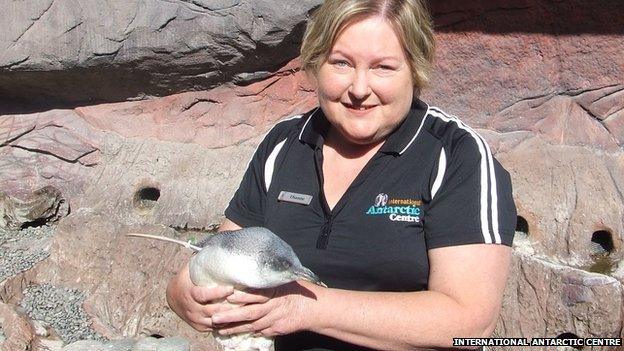
Dianne Lim trained as a beautician before becoming a penguin keeper
Dianne Lim, 53, works as a penguin keeper at the International Antarctic Centre in Christchurch, New Zealand. The centre is home to several native penguins with disabilities, who cannot survive in the wild.
I've been working with penguins for about six years now. I can't see myself doing anything else - I love it.
I normally get up at around 06:00. I normally start by going on a 4km (2 mile) walk with my dog. I have cereal and fruit for breakfast before heading to work.
At work, I start with a headcount to make sure all the penguins have survived the night.
We can house up to 26 penguins in our enclosure, which has a beach, several bedding boxes and a pool. We take in badly injured penguins that can't survive in the wild.
I have to scrub down the penguin beach every morning - it's always covered with poo. I go to their beds and change their sheets - they're also covered with penguin poo in the morning.
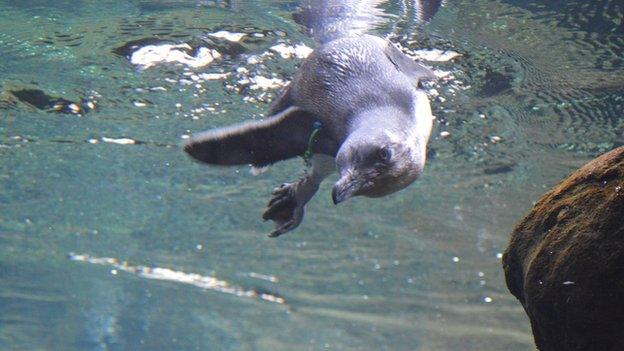
The centre includes a freshwater pool where penguins are fed
I need to prepare their fish before feeding time - we have a fresh water pool, not a saltwater pool, so we need to soak the penguins' fish in a bucket of salt water every day.
I put two vitamin pills under the gill of each fish to make sure the penguins get all the nutrients they need.
The penguins are still wild animals. When they first come to us they are injured, so we quarantine them for about three weeks, and get rid of fleas and any STDs they may have - they're very promiscuous in the wild.
We teach them to swim in a small pool downstairs, and help them with injuries. At that stage, they are sweet and bond quite well with us.
However, when we take them up to join the rest of the penguin colony they turn wild again - after that, they bite you when you pick them up.
It's very painful - they grab your skin, rip and twist it open. It's like pulling a sticking plaster off, but 100 times worse than that.
It's because penguins have fine bones, and are injured easily, so it hurts them when you pick them up. We only handle them if we're giving them medical attention.
Replica eggs
I often give group penguin tours around noon. After lunch, I go down to the plant room to make sure all the machines supporting the penguin colony are working.
I make sure the water recycling system is working, and collect rubbish out of the filter system. Then I put the fresh bedding in the penguin beds.
The female penguins get pregnant every so often. Whenever they lay eggs we gently take them away and replace them with replicas.
After about 40 days or so they'll think the egg's a dud and push them out of their nest. We give the eggs to the local university for research.
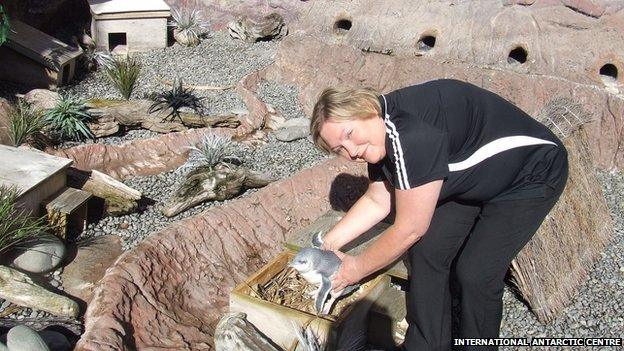
The keepers check the penguin boxes for eggs and replace them with replicas
Our permit only allows us to have 26 birds, so keeping baby birds would take up spots for injured birds who need a home. By law, we also have to release chicks to where their parents were found, but we don't know where all of our penguins come from.
In the afternoon, it's feeding time. I throw fish into the pool for the penguins, and feed the ones that aren't good at swimming on land.
I have to hand feed Turk, a white flippered penguin with brain damage, as she has a paralysed tongue.
After I've done my last feed, I wash the floor again, do another head count, and make sure everyone is tucked into bed.
You always go home smelling of fish! I went to the cinema with friends the other day, after two days off work - and my friends still asked what the smell was. And I already shower every day!
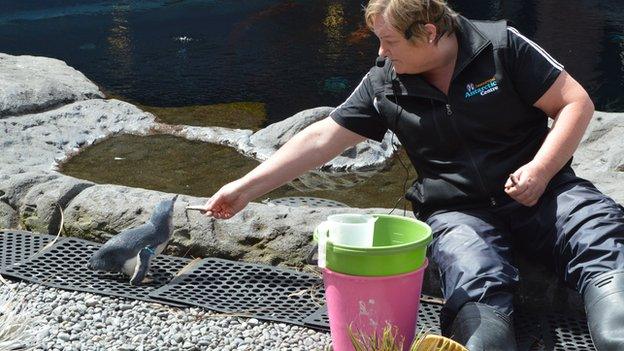
The weaker or shyer penguins are hand-fed on land
We give all the penguins names, and they have individual personalities.
Our penguin Lincoln has a badly broken beak, but he's very handsome and has about three girlfriends at the moment.
He's our most eligible bachelor and we call his bedroom the party bedroom as there are always lots of penguins in there!
Squirt and Yappy are our laziest penguins. They are lazy swimmers, so they will wait until the weaker penguins eat on land, and then steal their food.
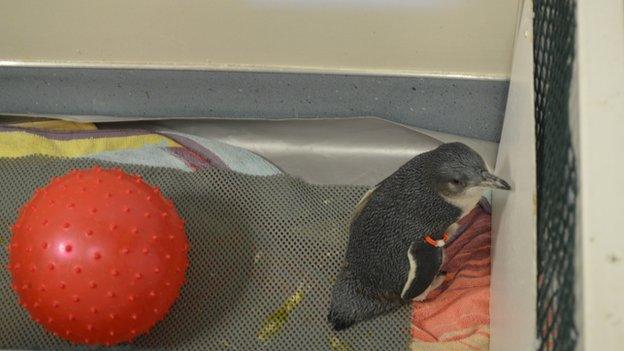
Injured penguins are cared for in a pen in the basement
I'm actually a fully trained beautician - that's my trade. But I needed to do more work when my kids were grown up.
I walked into the International Antarctic Centre in 2004 and they gave me a job working in the shop. I worked my way up to being a guide, and in 2007 they got penguins, so I started volunteering in the penguin enclosure.
I learned a lot from my colleagues - and then when a vacancy came up I applied. I was so thrilled when I got the job.
After the earthquake
The penguins were very scared during the 2011 Christchurch earthquake. We lost the water in the pool and the fire brigade had to come to pump water back in.
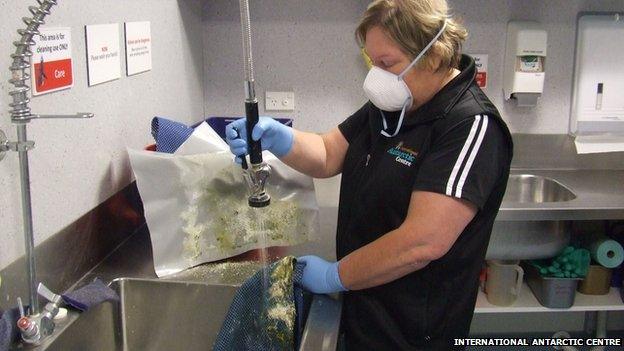
The job also involves cleaning dirty penguin bedding
We closed down the centre during the aftershocks, and the penguins slept outside their nests because they were scared and very stressed.
We had no tourists after the quake, so times were hard. The centre had no money, and we had to operate on a skeleton staff and do our own cleaning and everything.
Then the original owner sold the centre to Christchurch airport, which meant we got more funds. It took about six months before visitors started picking up again.
Christchurch was badly damaged by the earthquake, but I think we're starting to get things going again.
There's a good vibe, and a feeling of hope and good will in the city. I think Christchurch is going to be a beautiful and like a new city again.
Dianne Lim was talking to the BBC's Helier Cheung.